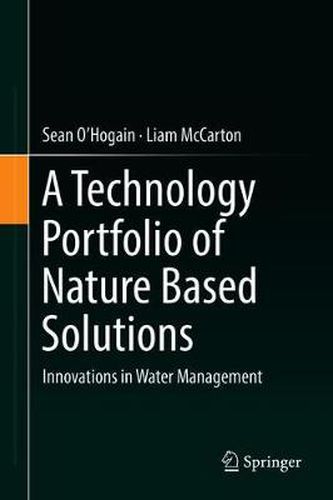Readings Newsletter
Become a Readings Member to make your shopping experience even easier.
Sign in or sign up for free!
You’re not far away from qualifying for FREE standard shipping within Australia
You’ve qualified for FREE standard shipping within Australia
The cart is loading…






This title is printed to order. This book may have been self-published. If so, we cannot guarantee the quality of the content. In the main most books will have gone through the editing process however some may not. We therefore suggest that you be aware of this before ordering this book. If in doubt check either the author or publisher’s details as we are unable to accept any returns unless they are faulty. Please contact us if you have any questions.
This book aims to define the concept of Nature Based Solutions (NBS) by using case studies from members of the European Innovation Partnership (EIP) Water Action Group - NatureWat. NBS is defined and characterized in terms of water source, contaminants, removal mechanisms and resource recovery potential. The case studies presented illustrate the appropriateness of NBS promoting climate resilience. Readers will discover a technology portfolio based on a number of demonstration sites in the fields of climate change adaption, water and wastewater treatment, resource recovery and re-use, and restoring ecosystems to promote the use of nature based solutions. The chapters in the book present a multidisciplinary approach involving social scientists, governance representatives and engineers.
The underlying philosophy of the book is the circular economy of water which prioritizes the concepts of resource recovery and resilience within water resource management. The first section of the book presents the background and objectives of the study, and how the action group aims to promote the use of nature based solutions through its diverse technology portfolio. Particular attention is given to the goals of finding cost-effective solutions for wastewater treatment, climate change mitigation, disaster risk reduction, flood protection, greening cities, degraded areas restoration and biodiversity preservation. The chapter on reclaimed water addresses water reuse and defines the term fit for purpose. Barriers and limitations related to NBS for water resource management are discussed. The book concludes with several case studies at local, regional and global levels which illustrate a new approach to water management. These case studies illustrate the application of a hybrid green and grey infrastructure system. This is a combination of traditional engineered infrastructure with nature based solutions which combines centralised and decentralised systems to optimise the reclamation of water for reuse in a fit for purpose model.
$9.00 standard shipping within Australia
FREE standard shipping within Australia for orders over $100.00
Express & International shipping calculated at checkout
This title is printed to order. This book may have been self-published. If so, we cannot guarantee the quality of the content. In the main most books will have gone through the editing process however some may not. We therefore suggest that you be aware of this before ordering this book. If in doubt check either the author or publisher’s details as we are unable to accept any returns unless they are faulty. Please contact us if you have any questions.
This book aims to define the concept of Nature Based Solutions (NBS) by using case studies from members of the European Innovation Partnership (EIP) Water Action Group - NatureWat. NBS is defined and characterized in terms of water source, contaminants, removal mechanisms and resource recovery potential. The case studies presented illustrate the appropriateness of NBS promoting climate resilience. Readers will discover a technology portfolio based on a number of demonstration sites in the fields of climate change adaption, water and wastewater treatment, resource recovery and re-use, and restoring ecosystems to promote the use of nature based solutions. The chapters in the book present a multidisciplinary approach involving social scientists, governance representatives and engineers.
The underlying philosophy of the book is the circular economy of water which prioritizes the concepts of resource recovery and resilience within water resource management. The first section of the book presents the background and objectives of the study, and how the action group aims to promote the use of nature based solutions through its diverse technology portfolio. Particular attention is given to the goals of finding cost-effective solutions for wastewater treatment, climate change mitigation, disaster risk reduction, flood protection, greening cities, degraded areas restoration and biodiversity preservation. The chapter on reclaimed water addresses water reuse and defines the term fit for purpose. Barriers and limitations related to NBS for water resource management are discussed. The book concludes with several case studies at local, regional and global levels which illustrate a new approach to water management. These case studies illustrate the application of a hybrid green and grey infrastructure system. This is a combination of traditional engineered infrastructure with nature based solutions which combines centralised and decentralised systems to optimise the reclamation of water for reuse in a fit for purpose model.